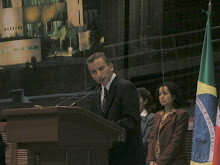Mario Vargas Llosa is one of the most important authors in Latin America, I like this book because it was written in 2000, then, the reality that it describes, is somehow related to the reality that the Latin American countries are facing nowadays. Even if the book is talking about the past, there are elements that guide us to the present.
First of all I am going to try to talk about the style; there is a Mexican movie “Amores Perros” (I do not know the translation, but it was nominated to the Oscar as the best foreign movie) this movie has three different stories that are interrelated with each other. When I was reading the nine stories that the book has, I was remembering when I saw that movie for the first time. The interaction between the different stories, creates the perception or the feeling, that, even if there are many different backgrounds in the characters, the final goal is the same.
The Urania’s roll in the story, is the most interesting for me. I can not say that she is the main character, but I think that she represents the present and the past of the Dominican Republic. The present when she is cold, uninterested about the situation; the pain that she has about the past, maybe represents the pain that the society feels in this moment.
In the final part of the book, for me is very interesting how Trujillo has a lot of influence even when he is death. The power that she had in his life overcome his own death.
Subscribe to:
Post Comments (Atom)

3 comments:
I too appreciated how Vargas Llosa formulates his novel through the perspectives of several different characters. It definitely made the book more engaging for me.
I like what you said about a combination of the past and present. I can definitely see how that's true, in that just because literature is written concerning a certain time period doesn't mean it's not applicable to other situations.
amigo, i agree with you. urania definetly to me plays the most interesing role, and i like how you pointed out that it is not only in the past, but also in the present.
I think you made a really interesting point when you say that the book is written about the past but still draws us to the present. I think that is a reason I probably enjoyed it so much more. I wonder is Llosa tried to connect the present because it shows that just because a dictatorship has fallen and the dictator dead, does not mean that there are not effects into the future.
Post a Comment